Overclocking Extravaganza: Radeon HD 4890 To The Max
by Derek Wilson on April 29, 2009 12:01 AM EST- Posted in
- GPUs
Combined Memory and Core Overclocking: The Sweet Spot
In this round of tests, we combine our previous maximum overclocks. This is our compromise, in that we show the maximum potential of combined core and memory overclocking rather than effects of memory overclocking over each core clock speed we tested. While the latter option would be more complete, our tests do enough to show people what they need to know to find the sweet spot.
We theorized that with an extreme core clock speed that memory may have become a bottleneck to performance at some point. Despite the fact that increasing memory clock without increasing core clock didn't do much at all, we could see increased benefit beyond what one might expect based on our initial memory overclocking results.
Before we looked at varied memory clock with a stock core clock and varied core clock with a stock memory clock. Let's revisit both of those but also add in a twist. We will also look at percent increase in performance when overclocking memory with a 1GHz core clock and the percent increase in performance when overclocking the core with a 1.2GHz memory clock.
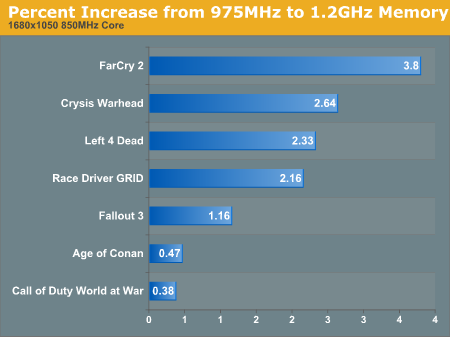
1680x1050 1920x1200 2560x1600
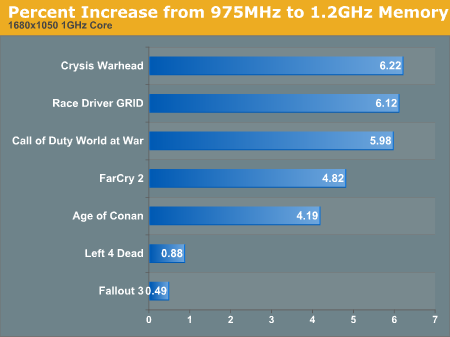
1680x1050 1920x1200 2560x1600
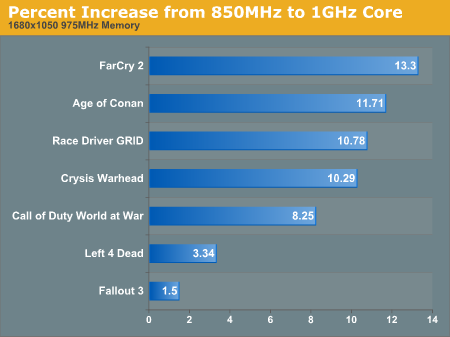
1680x1050 1920x1200 2560x1600
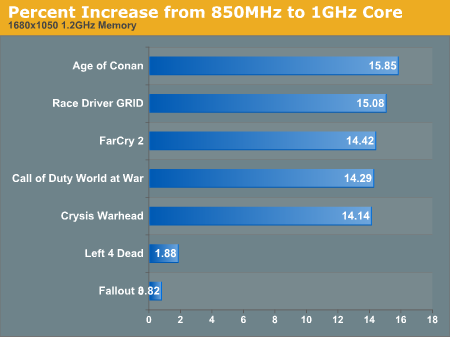
1680x1050 1920x1200 2560x1600
Note that in both cases we see a much bigger boost in performance. This means that while applications tend to be very heavily compute limited, at higher core clock speeds on AMD hardware memory bandwidth increasinly becomes a bottleneck. Now let's take a look at what we get when going from a completely stock part to a maximally overclocked part at 1GHz/1.2GHz (core/mem).
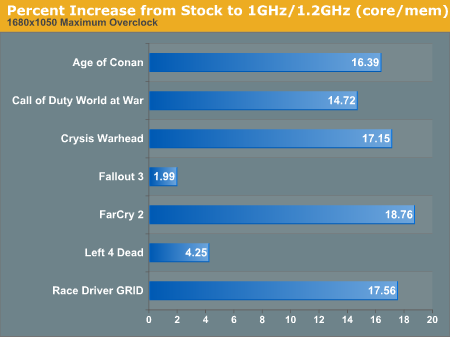
1680x1050 1920x1200 2560x1600
To get a basic idea of what's going on, here's an example of two programs. Remember that this isn't really real world and is just to illustrate the concept.
The first application is completely compute bound and the second is 50% compute bound and 50% memory bandwidth bound. Both tests generate 100 frames per second on a stock Radeon HD 4890. If we increase core clock speed 10%, the first application will generate 110 frames per second, while the second one would only generate 105. This is because we only see the 10% benefit while doing half of the work. If we look at only boosting memory performance 10%, the first program delivers only 100 fps while the second hits 105 again. Pushing both memory and core clock speed up 10% each gives us 110 frames per second from both applications. Basically.
Nothing is really that contrived or works like that, but the important thing to remember is that different applications can make varying use of different resources, and balancing those resources is important to ensuring the best performance in the most efficient package.
So, to find the sweet spot for your overclock, you will want to increase core clock speed as much as you can. Then bump up memory clock and see how high you can get it and remain stable. Use a real world application to test performance at each point and then use a binary search like algorithm to find the sweet spot in a short number of tests. And there you have it. We didn't do this for you, but what's better practice than a little hands on experience right? Besides, if gives readers the opportunity to compare notes in the comments on what the optimal memory clock for a 1GHz core clock on the 4890 would be. Have fun!










61 Comments
View All Comments
gold333 - Monday, May 4, 2009 - link
Guru3d has OC reports of both. The GTX275 seems to be clearly in the lead.SiliconDoc - Saturday, June 6, 2009 - link
" Guru3d has OC reports of both. The GTX275 seems to be clearly in the lead. "--
This is red roosterville. Compare the special edition from manufacturer ATI 4890 to the standard or sub OC GTX275, then spin it up more for the red roosters with special custom game profiles, resolution and game settings, and leave PhysX ON even if the game doesn't use it.
Post the massively biased results and provclaim ATI the overall superking winner.
Allow your red rooster fanbase and anyone else enjoy the fantasy, while lying as much as possible, and apologizing every time the bias is pointed out by a poster, claiming you didn't know, you'll fix it, that's a good question, you'll get to it, you didn't mean to compare Oc'ed ATI to stock GTX275 - etc etc etc .
--
That's why other reviews so often show the GTX275 way ahead. Not every single one - there are more red rooster stations about, but hey, some people like Derek just can't help themselves.
joeysfb - Thursday, April 30, 2009 - link
How to be fair?.. Overclocking is subjective in nature... So if Derek's card can overclock to 1G/1.2G and the one i bought can't do it. What's next?...This article is about 4890, GTX275 will have another article for itself. Beside, you are pretty fix that GTX275 is the better card anyway...
ira176 - Wednesday, April 29, 2009 - link
I've heard the rumor that the Radeon HD 5000 is around the corner, but will ATI incorporate 40 nm tech into the HD 4870 and 4890?Wouldn't it be a pretty neat card if Sapphire could get their hands on an HD 4890 with 40 nm tech and the Vapor-X cooling solution!
Shadowmage - Wednesday, April 29, 2009 - link
... you could have presented the graphs in a much more readable manner. The only thing you were really doing was finding the Amdahl's Law curves for the part.Watch out for sentence fragments in the future too :)
As an aside, usually mainstream hardware reviewers are absolutely horrible and incompetent at overclocking, so it's refreshing to see some results that actually match what end-users have been reaching on various enthusiast forums (~1GHz core clocks on stock air).
DerekWilson - Wednesday, April 29, 2009 - link
Thanks for the suggestions. Can you email me the sentence fragments :-)And actually we'd probably see more overclocking articles if I didn't take it seriously... I'm not the best at it, but I do what I can.
corporategoon - Wednesday, April 29, 2009 - link
Quite a few folks in here are talking about messing with voltages - how do you do this? I have a 4870 with a thermalright cooler and I'd love to mess with voltages to get some extra performance out of it, but have had no luck searching for a utility that'll let me do this.DerekWilson - Wednesday, April 29, 2009 - link
the ASUS card we tested actually comes with a utility to tweak its voltage. there are some hardware mods out there as well ... if you're really hard core you can go check out mvktech.net and download some bios readers/writers and editors and really go crazy (and possibly destroy your card).but there are options.
our tests were done without voltage mods.
walp - Wednesday, April 29, 2009 - link
Awesome test!I bought the 4890 for three reasons:
-Its funny to overclock and see the range soooaaAAaaaar!
-Its relatively cheap for top of the line performance (when overclocked to 1000\1150 @ 1.43V ^^) as you can clearly see!
-Its totally compatible with the accelero s1 which currently keeps my GPU below the 64°C at full load furmark. And its soooo silent! Gotta love it! 19 bucks for a kick ass cooler!
Enjoy the silence, and powah! :D
And when the games become more demanding, I will buy another one! (hopefully a lot cheaper, and a lot more developed x-fire drivers!)
Cause, I can play Crysis 1920x1080, very high, everything maxxed in Catalyst 8x AA, 16x AF etc. ~40-50fps AWESOME-O! :D
(4.4GHz E8500, 4GB ram)
Its a pity though that it costed me 2500kr incl. shipping (~300$) here in sweden, but its worth every Krona! :)
kmmatney - Wednesday, April 29, 2009 - link
Thanks for letting me know that it's compatible with the accerero S1! I would love this card if it were a little more quiet. Is this the one you have?http://www.newegg.com/Product/Product.aspx?Item=N8...">http://www.newegg.com/Product/Product.aspx?Item=N8...
Where did you get it for $19? I see this one for $19:
http://www.newegg.com/Product/Product.aspx?Item=N8...">http://www.newegg.com/Product/Product.aspx?Item=N8...
With my HD4890, there's a lot of heat coming out the back vent, so I'm a bit leary about using something like this, but if it makes the card cooler and quieter, then I'm all for it.